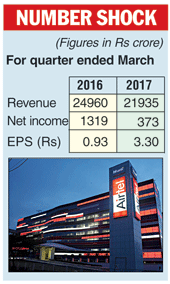New Delhi, May 10: The government's move to change petrol and diesel prices on a daily basis - currently being tested in five cities - is likely to improve the marketing margins of PSU oil retailers, according to a India Ratings study.
In fact, after the launch of the pilot this month in five cities - Puducherry, Visakhapatnam, Udaipur, Jamshedpur and Chandigarh - prices have fallen.
In Jamshedpur, petrol prices have fallen Rs 1.2 per litre to Rs 68.06 per litre and diesel prices by Rs 1.43 per litre to Rs 58.83 per litre.
The government is keen to extend the norm to other parts of the country after the oil marketing PSUs assess their experience in the five cities.
The India Ratings report said the daily revision would increase the marketing margins of state-run Indian Oil Corporation, Hindustan Petroleum and Bharat Petroleum and has cited three reasons for this.
First, this gives companies greater flexibility to pass on crude price volatility to consumers; second, it lowers the need for steep hikes as in the fortnightly pricing regime thus lowering the possibility of political intervention; and finally, it lowers the chances of hoarding by dealers in anticipation of a hike.
India Ratings said the move was another piece of reform in fuel retailing - starting with petrol price deregulation in 2010 and diesel in 2014, direct transfer of LPG subsidy to bank accounts, the give-it-up scheme for LPG and lowering kerosene allocation in ration shops.

Petronet
Petronet LNG Ltd, the country's biggest importer of liquefied natural gas, today reported its highest quarterly profit for the January-March period as it raised terminal charges and processed more gas. Its net profit at Rs 470.79 crore (Rs 6.28 per share) was 92 per cent higher than Rs 245.31 crore (Rs 3.27 a share) a year ago.
Also, the company processed 180 trillion British thermal units (tBtu) in the fourth quarter up from 150 tBtu in the same period a year ago. Petronet also posted its highest ever yearly net profit at Rs 1,705.59 crore, up 87 per cent over the previous year.
The Petronet board also raised dividend by 50 per cent to Rs 5 per share for the year ended March 31, 2017.
The board also declared a 1:1 bonus issue.
The under-recoveries of the three oil PSUs have also fallen, which have led to a fall in their borrowings by as much as 29 per cent between 2013-14 and 2015-16 and interest cost by 37 per cent.










